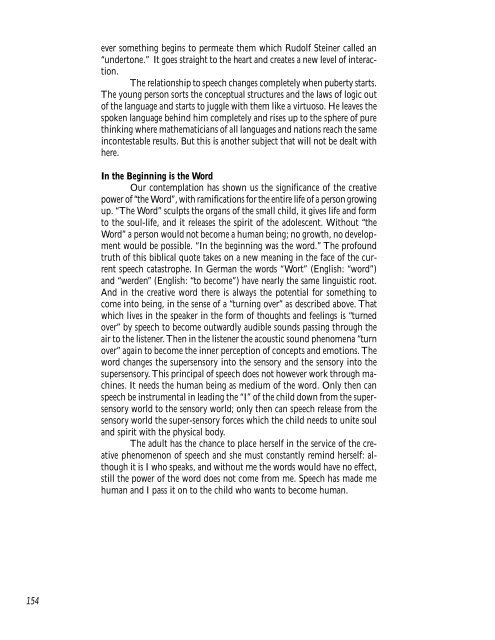Colloquium on English - Research Institute for Waldorf Education
Colloquium on English - Research Institute for Waldorf Education
Colloquium on English - Research Institute for Waldorf Education
You also want an ePaper? Increase the reach of your titles
YUMPU automatically turns print PDFs into web optimized ePapers that Google loves.
154<br />
ever something begins to permeate them which Rudolf Steiner called an<br />
“undert<strong>on</strong>e.” It goes straight to the heart and creates a new level of interacti<strong>on</strong>.<br />
The relati<strong>on</strong>ship to speech changes completely when puberty starts.<br />
The young pers<strong>on</strong> sorts the c<strong>on</strong>ceptual structures and the laws of logic out<br />
of the language and starts to juggle with them like a virtuoso. He leaves the<br />
spoken language behind him completely and rises up to the sphere of pure<br />
thinking where mathematicians of all languages and nati<strong>on</strong>s reach the same<br />
inc<strong>on</strong>testable results. But this is another subject that will not be dealt with<br />
here.<br />
In the Beginning is the Word<br />
Our c<strong>on</strong>templati<strong>on</strong> has shown us the significance of the creative<br />
power of “the Word”, with ramificati<strong>on</strong>s <strong>for</strong> the entire life of a pers<strong>on</strong> growing<br />
up. “The Word” sculpts the organs of the small child, it gives life and <strong>for</strong>m<br />
to the soul-life, and it releases the spirit of the adolescent. Without “the<br />
Word” a pers<strong>on</strong> would not become a human being; no growth, no development<br />
would be possible. “In the beginning was the word.” The profound<br />
truth of this biblical quote takes <strong>on</strong> a new meaning in the face of the current<br />
speech catastrophe. In German the words “Wort” (<strong>English</strong>: “word”)<br />
and “werden” (<strong>English</strong>: “to become”) have nearly the same linguistic root.<br />
And in the creative word there is always the potential <strong>for</strong> something to<br />
come into being, in the sense of a “turning over” as described above. That<br />
which lives in the speaker in the <strong>for</strong>m of thoughts and feelings is “turned<br />
over” by speech to become outwardly audible sounds passing through the<br />
air to the listener. Then in the listener the acoustic sound phenomena “turn<br />
over” again to become the inner percepti<strong>on</strong> of c<strong>on</strong>cepts and emoti<strong>on</strong>s. The<br />
word changes the supersensory into the sensory and the sensory into the<br />
supersensory. This principal of speech does not however work through machines.<br />
It needs the human being as medium of the word. Only then can<br />
speech be instrumental in leading the “I” of the child down from the supersensory<br />
world to the sensory world; <strong>on</strong>ly then can speech release from the<br />
sensory world the super-sensory <strong>for</strong>ces which the child needs to unite soul<br />
and spirit with the physical body.<br />
The adult has the chance to place herself in the service of the creative<br />
phenomen<strong>on</strong> of speech and she must c<strong>on</strong>stantly remind herself: although<br />
it is I who speaks, and without me the words would have no effect,<br />
still the power of the word does not come from me. Speech has made me<br />
human and I pass it <strong>on</strong> to the child who wants to become human.

















